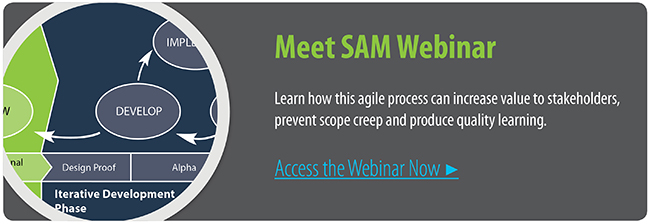Blog
A Purposeful Change to Your e-Learning Projects
by Richard Sites, vice president - training and marketing | @rhillsites


Is Every Process Really ADDIE?
By Richard Sites | January 09, 2014 | Custom Learning | 0 Comments
by Richard Sites, vice president - training and marketing | @rhillsites
 The start of a new year is always a time for reflection, a time to consider the efforts we made over the past year, and the fruits born from those efforts. We also often take time to consider what we didn’t accomplish in the past twelve months.
The start of a new year is always a time for reflection, a time to consider the efforts we made over the past year, and the fruits born from those efforts. We also often take time to consider what we didn’t accomplish in the past twelve months.
Having traveled the US (and internationally) to discuss Leaving ADDIE for SAM, I know one thing many of you did not do last year—Leave ADDIE.
While the reasons are numerous, I have come to believe there is one particular reason why so many profess their allegiance to ADDIE—there isn’t anything else. Following many of my talks on SAM (Successive Approximation Model), it is very common for someone to say, “This is just another version of ADDIE.” (After hearing this repeatedly, I have learned to offer an understanding smile, which masks my internal amazement.) The reason this statement is amazing to me is:
- 1) it’s not entirely accurate, and
- 2) it is one of the main reasons why Michael Allen set out to write Leaving ADDIE for SAM.
 I am always amazed at the lack of agreement in our industry on what ADDIE is or isn’t. The process of designing and developing instruction isn’t ADDIE. ADDIE (or whatever you are doing and calling ADDIE) is one particular approach to building instruction. The term ADDIE is not an inclusive description of all instructional design and development efforts. Yet many of us consider it so.
I am always amazed at the lack of agreement in our industry on what ADDIE is or isn’t. The process of designing and developing instruction isn’t ADDIE. ADDIE (or whatever you are doing and calling ADDIE) is one particular approach to building instruction. The term ADDIE is not an inclusive description of all instructional design and development efforts. Yet many of us consider it so.
ADDIE (Analysis, Design, Develop, Implementation and Evaluation) are components found in nearly every decision-making process—even something as removed from training as your menu for your dinner party. So simply because an ISD model includes those same decision-making elements does not make it a version of ADDIE.
Even if we, as a profession, share some common principles, our execution of these principles can (and do) differ. There are many different methods, strategies, and approaches based on the generally accepted notions of Analysis, Design, Development, Implementation and Evaluation. They are not all ADDIE. It is highly probable the process you and your organization employs is dissimilar to the process of another organization even if you both consider your process to be ADDIE. But ADDIE, and all of its adaptations, makes so much sense that it is hard for many of us to think that there could be anything better, or for that matter anything different.
SAM is an iterative process—a different approach to the design and development of instruction. SAM challenges the notion of moving through a linear process from Analysis to Evaluation as an effective strategy for designing learning events that produce greater performance. SAM addresses the challenges that we all face—product quality, meeting timelines and budgets, and managing SMEs. And, most importantly, SAM is a process built specifically for the creation of performance-driven learning.
I have accepted that I cannot convince (nor should I even hope to convince) everyone to leave the activities, strategies, and processes they currently use. My wish this year is that I can persuade more people to stop calling all design and development approaches ADDIE! Heck, this year I challenge you to give your process a name other than ADDIE! I’d love to hear some names you may have for what you are currently doing.


About the Author: Richard Sites
Comments
Would you like to leave a comment?
Related Blog Posts

By: Richard Sites | Jul, 2012
Category: Custom Learning, Strategic Consulting

Blog
Prototypes Are Essential to e-Learning Design
by Richard Sites, vice president - training and marketing | @rhillsites
By: Richard Sites | Jan, 2013
Category: Custom Learning, Strategic Consulting

Blog
ADDIE: By Any Other Name Would Smell As Sweet…
by Richard Sites, vice president - training and marketing | @rhillsites
By: Richard Sites | Sep, 2012
Category: Custom Learning, Strategic Consulting

